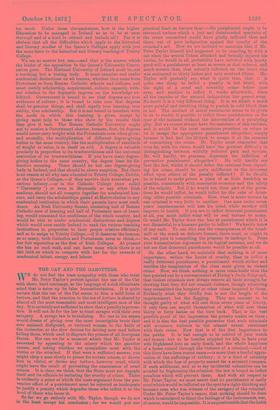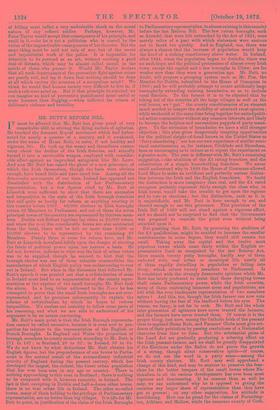THE CAT AND THE GAROTTERS.
‘ATE do not feel the least sympathy with those who treat Mr. Peter Taylor's protest against the use of the Cat with sheer, hard contempt, as the language of a sick effeminate mind that is eaten up by false humanitarianism. It is quite certain that the use of the Oat seems to him a mild form of torture, and that the aversion to the use of torture is shared by almost all the most reasonable and most intelligent men of the day. It is certainly not sufficient to show that a penalty is preven- tive. It will not do for the law to treat savages with their own savagery. A savage law is brutalising. No one in his senses would dream of giving over the most incorrigible brute that ever maimed, disfigured, or tortured woman to the knife of the vivisector, or the slow devices for driving men mad before killing them, which used to disgrace the prisons of all European States. Nor can we for a moment admit that Mr. Taylor is answered by appealing to the misery which the garotter causes, and asking whether we sympathise most with the victim or the criminal. If that were a sufficient answer, you might chop a man slowly to pieces for certain crimes, or drown him in vitriol, or devise any torture, however cruel, which might have the result of preventing the commission of cruel crimes. It is clear, we think, that the State must not degrkde itself and its officials by imitating the cruelty of crime. There is evidently a point at which the mere argument from the pre- ventive effect of a punishment must be rejected as inadequate to justify a penalty which degrades those who inflict it to the level of those who incur it.
So far we go entirely with Mr. Taylor, though we do not in the least accept his conclusion ; for we would put our practical limit on torture thus :—No puniphtuent ought to be esteemed torture which a just and disinterested spectator of the crime committed would have gladly inflicted then and there, out of pure indignation against the cruelty of the criminal's act. Now we are inclined to maintain that if Mr. Peter Taylor himself had happened to be standing by with a cat when the wretch Cohen attacked and brutally injured his victim, he would in all probability have inflicted with hearty good-will a punishment at least as severe as that ordered, and much severer than that actually inflicted, on the brute who was sentenced to thirty lashes and only received fifteen. Mr. Taylor will probably say, what is quite true, that it is quite one thing to inflict a penalty in hot blood, with the sight of a cruel and cowardly crime before your eyes, and another to inflict it weeks afterwards, when all the impulse of the natural indignation has passed away. No doubt it is a very different thing. It is, we admit, a much more painful and revolting thing to punish in cold blood than in hot. The instinct of moral resentment seems to be given to us to render it possible to inflict these punishments on the spar of the moment without the intervention of a paralysing pity. But we cannot always have the assistance of this instinct, and it would be the most monstrous premium on crime to let it escape the appropriate punishment altogether, simply because it had had the ill-luck to escape it at the moment of committing the crime. Mr. Taylor must remember that even he, with his views, would have the greatest difficulty ia distinguishing between wilfully inflicted pain and torture. He will hardly, we presume, deprecate the infliction of preventive punishment altogether ? He will hardly say that the law, whilst it should debar the criminal from repeat- ing his crime, should be quite indifferent to the deterrent effect upon others of the penalty inflicted ? If he should, he is bound to make prison a place of as little hardship as possible, consistently with reasonable economy and the safety of the culprits. But if he would not, then part of the priva- tions he would inflict, he would inflict for the sake of deter- ring other possible criminals. Now, what is acute torture to- one criminal is very little to another. One man under seven years' imprisonment will lose his mind, while another will improve in health. If you are to inflict deterrent punishment at all, you must inflict what will be real torture to many. Or would Mr. Taylor draw the line at punishment which it is not distasteful to a humane gaoler to inflict ? We hardly know of any such. To one who sees the consequences of the tread- mill or the crank on delicate frames, there must, or ought to be, real pain in compelling the prisoner to undergo it. Press your humanitarian argument to its logical extreme, and we do not see that deterrent punishment would be possible at all.
On the other hand, we maintain that nothing is of more importance, within the limits of cruelty, than to inflict a really deterrent punishment, a punishment which strikes and, terrifies the imagination of the class most given to violent crime. Now, we think, nothing is more remarkable than the. fact pointed out by a correspondent of Friday's Daily Telegraph, that violent criminals now always reserve all their strength for showing that they did not commit violence, though admitting they committed the burglary or other crime imputed to them. Evidently what they vividly fear is not the length of the imprisonment, but the flogging. They are content to be thought guilty of what will cost them seven years of liberty, if only they can acquit themselves of what will cost them thirty or forty lashes on the bare back. That is the best possible proof of the impression the penalty makes on them ; and it is also the beet possible guarantee that such criminals will economise violence to the utmost extent consistent with their crime. Now that is of the first importance to the public. It is bad enough to be robbed of your watch and money, but to be besides crippled for life, to have your wife frightened into an early death, and the whole happiness of a home ruined through the violence of a criminal,—and of this there have been recent cases,—is more than a fearful aggra- vation of the sufferings of robbery ; it is a kind of calamity with which the loss of property cannot for a moment compare. If such additional, and so to say incidental calamities can be avoided by frightening the criminal, the law is bound to inflict penalties which will prevent them. And with all respect to Mr. Peter Taylor, we must assert that no punishment is really cruel which would be inflicted on the spot by a right-thinking and humane man who was witness of the savagery of the criminal. Under Mr. Peter Taylor's canon, that nothing should be done which is calculated to blunt the feelings of the instruments, war, of course, would be impossible. It is unquestionable that the habit of killing must inflict a very undesirable shock on the moral nature of any refined soldier. Perhaps, however, Mr. Peter Taylor would accept that consequence of his principle, and exult in it,—for he is not a politician who is scared by the vision of the impractieable consequences of his theories. But the same thing must be said not only of war, but of the secret and inquisitorial work of the police. It is impossible for detection to be pursued as an art, without exciting a good deal of distaste, which may be almost called moral, in the minds of those who pursue it. Would Mr. Taylor declare that all such departments of the preventive fight against crime are purely evil, and lay it down that nothing should be done at all which excites the aversion of a scrupulous mind ? We think he would find human society very difficult to live in, if such a rule were acted on. But if that principle be rejected, we can imagine no kind of preventive punishment more useful or more humane than flogging,—when inflicted for crimes of deliberate violence and brutality.



































 Previous page
Previous page